All images courtesy of Guy Fletcher

Every megaband has its unsung heroes and every platinum album is greater than the sum of its parts. While many know Mark Knopfler, the guitar virtuoso, and de facto leader of Dire Straits, many aren’t aware of the rest of the bands’ important contributions. Enter Guy Fletcher.
Guy got his start in music very early in life by not only being surrounded by music as a child, but also through his studio work in his mid-teens running errands, and secretly recording his own band in them while he worked.
Guy’s perseverance paid off and he was discovered amongst a booming pub scene, which eventually led to a chance meeting with Mark Knopfler just in time to record the genre-breaking mid-80s AOR staple, Brothers in Arms, and the rest, as they say, is history.
If you’d like to learn more about Guy Fletcher, head over to his webpage, and dig in. Once you’re done here, be sure to check out our interview with John Illsley for more Dire Straits info, and history!
Andrew:
Guy, thank you so much for doing this with us today. How have you been holding up these past couple of years?
Guy:
The last few years have been particularly tough on the music industry and its support network, we were fortunate as our Mark Knopfler tour was completed just before the pandemic in late 2019. Since then, I have spent almost all my time in the studio either with Mark, on my album, or other projects. It certainly has helped to have a studio at home.
Andrew:
What were your musical beginnings? You grew up surrounded by music with your parents and uncle in The Cameos. Can you dig into your family’s musical influences on you and when it clicked for you that music is what you wanted to do?
Guy:
Yes, music was ever-present in our household and early memories were of The Beatles, The Beach Boys, and the hits from across the pond in the early 60s. Paul McCartney’s talent as a musician was probably the biggest single influence on me and might be why my first instrument was the bass guitar. In my mind, you get the bigger picture when playing bass, harmonically speaking. Ultimately, of course, it wasn’t enough, and a move towards keyboards became essential. I am completely self-taught.
Andrew:
You even started working in the music industry at a young age. Can you dig into your time with ATV music publishing and DJM studios?
Guy:
Yes, Lew Grade and ATV Music gave me my first break, after writing to just about every studio and publisher in London when I was fifteen. My time there was mostly spent in the post room and as a runner for the various in-house songwriters, such as Lyndsey De Paul, Simon May, Barry Blue, and Ron Roker. I learned the geography of central London very quickly, in those days, the studios and publishers were all within a square mile or two of each other so I walked (or ran) everywhere, delivering tapes, demos, and masters. The post room was situated at the rear of the building in Bruton street, right next to the office of Northern Songs, recently acquired by ATV. When a job at DJM studios in New Oxford Street came up, I leaped at the chance and left ATV without fulfilling my employment contract. I was told I’d, “Never work in the business again,” by Peter Phillips, the MD. So, the very next day, I started at DJM as a tape op/assistant, and they put me to work right away in the tape copy room. Elton John and Johnny Guitar Watson were prominent artists for DJM, and I was solely responsible for making their master tape copies (usually with alternate sequencing) for distribution to vinyl production worldwide. I was seventeen. In my copy room, there was a cupboard that was full of old, poorly labeled Beatles demos and tapes, which of course have now been re-discovered, and make up most of the Anthology series. I’ve never been far from that band it seems.
Andrew:
What ultimately led you to the keyboard? Who were some of your influences?
Guy:
I always loved Keith Emerson, Jon Lord and of course, the amazing works of Stevie Wonder, and Billy Preston. Stevie Wonder, Joe Zawinul, Chick Corea, and George Duke all fascinated me too, but it was the arrangements on records of the 70s by bands like Steely Dan, Supertramp, Fleetwood Mac, Stevie Wonder, and Tom Petty that gave me the greatest incentive to make records.
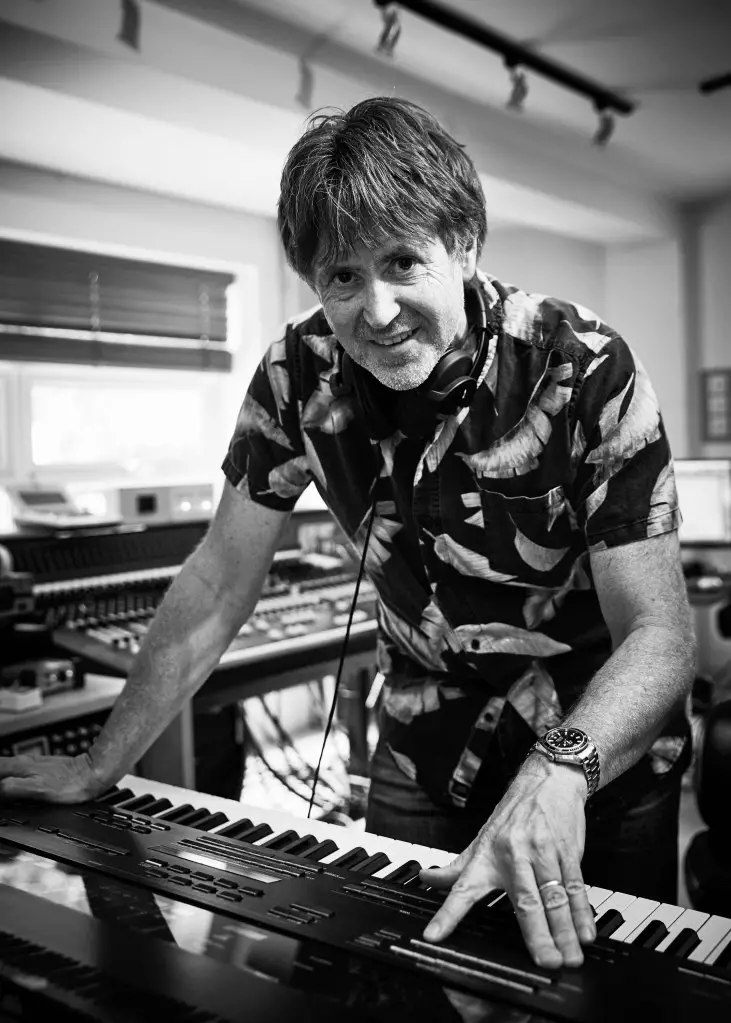
Andrew:
During your time working in the studio, you were also in a band. What was your first band like? What kind of music did you play?
Guy:
Yes, I was in many bands, mostly dreadful, Rock, or occasionally, pretend-Jazz Fusion. I used to sneak one incarnation into the studio at night to record our stuff. It would never have been allowed had I asked. It was the only way I could engineer stuff on my own as I was not experienced enough to take on studio sessions yet, that came soon after however. It only took one engineer to call in sick, and I was off and running. That is the reason I spent a lot of time asleep underneath the old MCI console after the sessions. I recently wrote a song about that experience called “Shagpile Bed.” It’s on my new album, Anomaly, which will be released in 2022.
Andrew:
This is when your musical career started to take off, correct? You had more and more gigs which subsequently led you to Dire Straits. How did you meet Mark Knopfler?
Guy:
My performance career got kick-started when a manager saw my band in a pub and signed us for a one single deal backing a singer called Amy (Maz Roberts, now the wife of Pino Palladino). The band didn’t last, but the manager (Anne-Marie Mackay) took me on board and got me a gig with Cockney Rebel as she was married to Duncan Mackay, who at that time left Cockney Rebel to join 10CC. So, I toured with Steve Harley’s band, and it was when she met Ed Bicknell, Dire Straits’ manager, I was introduced to Mark [Knopfler], as he was looking for someone to join his band. I couldn’t join him straight away however as I had committed to a tour with a band called Roxy Music. That was the Avalon World Tour in 1981-82. After the Roxy Tour, I went along to Mark’s house and introduced myself to him, and he introduced me to his new toy, a Synclavier recording system. He needed someone who could operate it, and to work on a movie with him called Cal.
Andrew:
You joined Dire Straits in time to record Brothers in Arms and the rest is history. What were some of your favorite Straits songs to play live?
Guy:
Yes, I did two films with Mark before I was asked to join the band — Cal and Comfort And Joy. We rehearsed at a studio called The Gallery, in Chertsey, then owned by Phil Manzanera (ironically where I auditioned for Roxy), then we flew to Montserrat, and spent three months making the album. I enjoyed every song we played live but “Money For Nothing” still stands out.
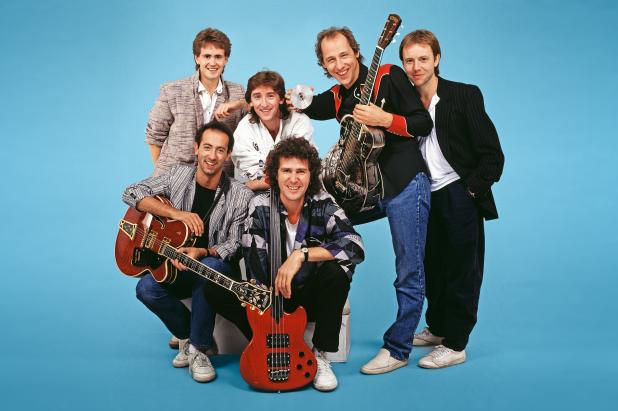
Andrew:
What was it like joining Dire Straits at the height of their popularity? Was it a lot to keep up with?
Guy:
Well, to be honest, I didn’t have time to really think about it, we were off and running before it sank in. I didn’t find it difficult at all since I had just been introduced to the big wide world with Roxy. I already had my touring legs.
Andrew:
I was talking to John Illsley a few weeks ago, and I asked him about the musical landscape of the early years of the band. What was it like for you having joined in the 80s?
Guy:
Having worked with Mark for so long now, of course, I learned a huge amount musically speaking before becoming a band member, but I also realized how strong my early musical influences were, as I never felt out of place. The irony, of course, is that I knew so little about the band when I joined, I’m not even sure I had previously heard “Sultans Of Swing.” It just passed me by. The band was already in transition when I joined, with the addition of multiple keys players, so I became a part of that evolution, especially since I was very familiar with the latest in FM synthesis, and had plenty of time with the Synclavier, I could offer that soundscape to the productions. That’s when I bought the Yamaha DX1, another monster of the FM synth world. The DX1 features heavily on that album.
Andrew:
What are some of your favorite memories with Dire Straits, as well as favorite venues, and places that your music has taken you to as a whole?
Guy:
We had so much fun making Brothers in Arms, not simply because of the venue, I love Neil Dorfsman and learned so much from him, in fact, the entire team, tech staff as well were one big happy family for three months. Then, of course, to go straight out and do a world tour where everywhere we played, we were number one was astonishing. Again, no time to stop and take it all in. The large outdoor venues we played were all special, but when we played Live Aid, for me that was a high point. We were in the middle of a long run of shows at Wembley Arena and negotiated an earlier slot at Live Aid so we could walk across an empty car park after our performance to do our soundcheck for our evening show. We were grateful we were in the middle of a tour, as the monitoring on stage at Live Aid was almost nonexistent (all we had in the wedges was the kick drum), so we played on auto-pilot.
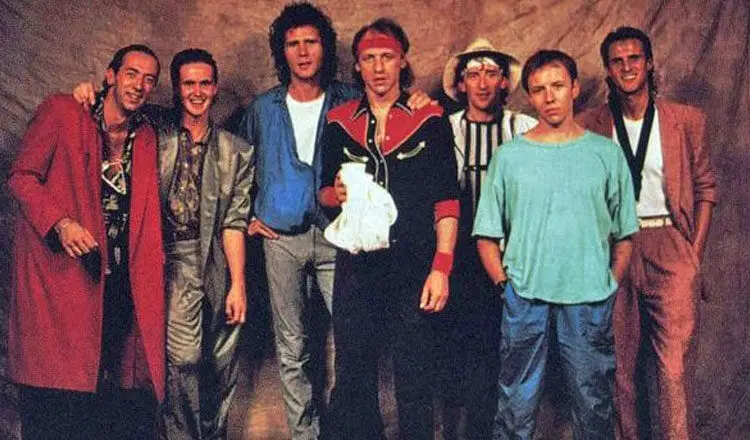
Andrew:
What were your remaining years like with Dire Straits leading up to disbanding in the 90s?
Guy:
After the Brothers In Arms Tour, we had a break where I did many sessions in London for all sorts of artists. Then we regrouped to record On Every Street, at Air Studios, Oxford Circus. This time, I was on the production team. We spent a lot of time making the record, and by the time we toured, we were ready to get out there. The tour lasted fourteen months, and by the end of it, we all knew it was over.
Andrew:
Can you talk about some of the collaborative work you’ve done? What was it like working on Mick Jagger’s debut album She’s the Boss, and also working with Tina Turner, that must’ve been quite an experience!
Guy:
It was an honor to play on all the records I’ve played on, particularly Tina. She impressed me more than just about any artist I’ve ever met. Not just for her incredible talent and professionalism, but for her kindness. We saw her a few times when our paths crossed on tours, and she was always so friendly and welcoming. Mick was a whirling dervish, couldn’t stand still, Bill Wyman more recently is the exact opposite, very sweet, quiet, friendly, and hilariously funny. I recently had the pleasure of playing on Christine McVie’s album, which is coming out next year, produced by my dear friend Glyn Johns. Christine’s voice is simply stunning.
Andrew:
Since the end of Dire Straits, you’re still working with Mark, how’s that going? You’ve recorded quite a lot over the years.
Guy:
You could say that. We seem to be inseparable as we have a well-evolved musical understanding of each other. Mark and I spend a lot of time recording, arranging, and experimenting in the incredible facility that is British Grove Studios. Quite the most idyllic place of work one could imagine, with just about every conceivable piece of recording equipment, old and new. The key to British Grove is the attention to detail, and the hugely experienced maintenance staff headed by Graham Meek (ex. Decca), who are there every day. We are currently working on Mark’s new album, and are gearing up for a full band session next month.
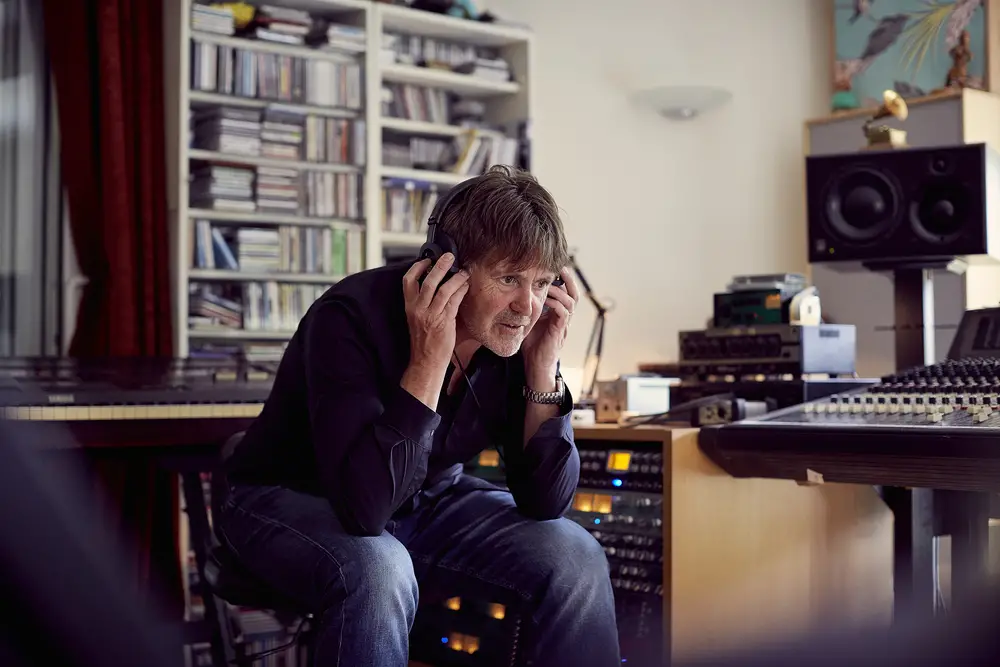
Andrew:
You also have a passion for storytelling as we can see with your solo work. Was it an easy transition to go from Dire Straits to your solo work?
Guy:
I never needed to make any kind of transition as I have always recorded, and written my own songs. Inevitably, there are influences from Mark, the band, and the storytelling is something I enjoy more and more, but it’s mostly the actual processes involved in making records that get me fired up.
Andrew:
What equipment do you use to play and record with?
Guy:
In the studio, I use Pro Tools and Cubase linked via the internal IAC bus on Mac OS, alongside various tape machines. Studer A800, A827, and A80. As far as synths go, I have a Yamaha CS80 and still have the DX1, a Prophet, various Roland synths, Hammond B3’s and Vox Continental, a Wurly’s, and a Rhodes. I also have a collection of guitars at home, a ’59 Precision bass, various Martin acoustics, Fender Strats, a Les Paul, and an array of Lap Steel guitars from the 40s and 50s. For a keys player, I have a lot of guitars. My live rig for the last tour was predominantly Roland gear, Fantom, JD-XA, System8, and a couple of MacBook Pro’s running Mainstage, mostly for samples (previously played back on Akai S6000’s).
Andrew:
Who are some of your favorite artists? Do you collect any kind of music? Vinyl, CDs, tapes, cassettes, etc.?
Guy:
My favorite artists are always changing, especially as I hear new bands. I also love to re-discover music from the past. I do have a modest vinyl collection but it’s mostly records I bought when I was young — Steely Dan, Stevie Wonder, ELP, Pat Metheny, Van Morrisson, etc. All sorts. These days, of course, as much as I hate it, it’s all streamed. My favorite medium is half-speed vinyl, as we recently used Miles Showell at Abbey Road to do the remastered half-speed versions of Brothers In Arms, and Local Hero. It’s a very time-consuming, expensive process, but I think it can’t be beaten.
Andrew:
What does your future look like from here? What’s next on your schedule?
Guy:
My current priorities are to finish Mark’s next album and to release my album, called Anomaly. I am also producing a charity project for Teenage Cancer Trust, which involves just about every great living guitar player, an enormous collaboration. More on that in a few months. I am looking forward to producing various things. No tours are planned, unfortunately.
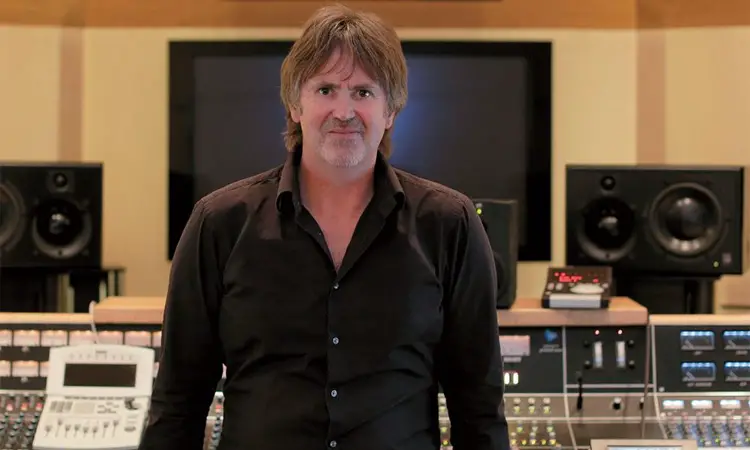
Interested in learning more about the music of Guy Fletcher? Check out the link below:
Be sure to check out the full catalog of AM Radio by Anthony Montalbano here: www.vinylwritermusic.com/interviews
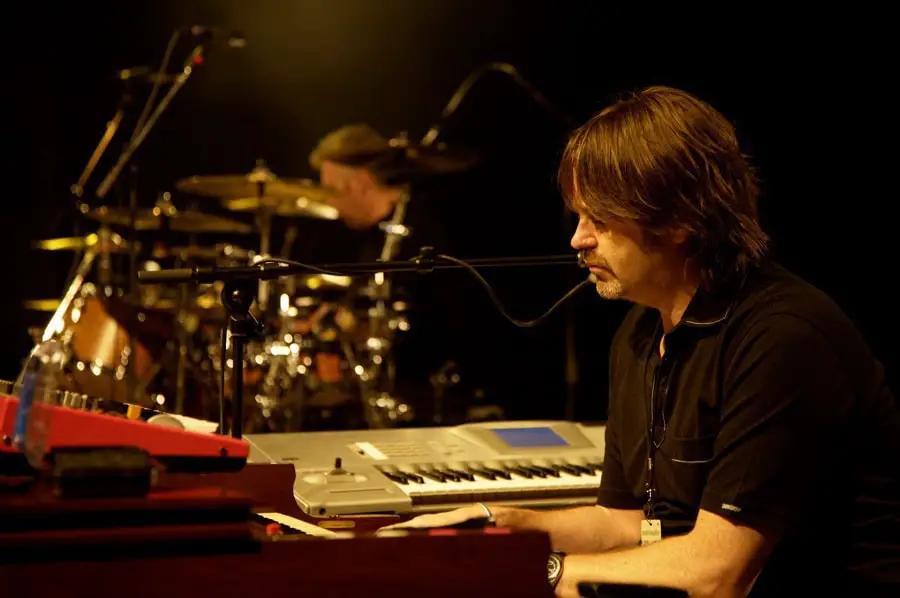




Leave a Reply